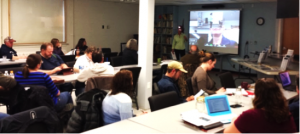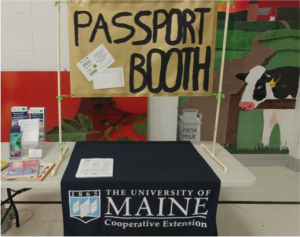Farming and Gardening Programs
One Tomato™
 Almost 1,400 cherry tomato plants have been distributed in the past four years through the One TomatoTM program sponsored by the Piscataquis County Extension Executive Committee. This year red, orange or yellow cherry tomato seedlings were distributed to 430 people. One of the varieties is blight resistant that will help with controlling this disease.
Almost 1,400 cherry tomato plants have been distributed in the past four years through the One TomatoTM program sponsored by the Piscataquis County Extension Executive Committee. This year red, orange or yellow cherry tomato seedlings were distributed to 430 people. One of the varieties is blight resistant that will help with controlling this disease.
This fall people will be asked what color their tomatoes were, how well they grew, and how much they were able to harvest.
As in previous years there were a number of people who have never gardened (21% in 2017) and this tomato seedling will be part of their first-year gardening effort.
We also found that 19% of folks were not familiar with University of Maine Cooperative Extension and the resources available to them from the local office. All who signed up were offered a chance to receive the Central Maine Gardening Newsletter by email.
If it is like previous years each plant will give back over $5.00 worth of cherry tomatoes during the growing season or over $2,000 in fresh cherry tomatoes to those who participated this year. Many gardeners are even more successful with over a gallon of cherry tomatoes being produced.
Passport to Summer Fun
The Piscataquis Passport Project encourages kids’ attendance at Free Summer Meals and Community Dinners, shopping at Dover Cove Farmers’ Market, and participation at the Thompson Free Library and SeDoMoCha School Garden.
4-H Market Kids, a Penobscot County program initiated by Barb Baker, inspired the Piscataquis Passport Project. Trisha Smith, Home Horticulture Aide in Piscataquis County, wanted to expand the focus of Barb’s program beyond farmers’ markets. As coordinator of the Sedomocha School Garden, Trisha was also looking for ways to bring students to the garden in the summer. Other folks in Piscataquis County were interested in promoting Free Summer Meals at SeDoMoCha and Mayo Regional Hospital, encouraging attendance at Thompson Free Library’s summer programs, and engaging kids at Dover Cove Farmers’ Market.
Tapping into the spirit of cooperation central to UMaine Extension, Trisha worked with Piscataquis Healthy Food for All as well as representatives of other concerned organizations to include a variety of free kids’ activities on the Piscataquis Passport Project.
Passports were given out to 28 youth in June during the first week of Free Summer Meals. During the summer youth get their passports marked when they:
- Enjoy a free summer meal at Sedomocha or Mayo Hospital
- Attend free community dinners
- Go to Dover Cove Farmers’ Market to pick up and spend Veggie Vouchers,
- Attend a program at Thompson Free Library
- Visit the Sedomocha School Garden on Thursday mornings
Passports dropped off at the UMaine Extension office by August 23 win a prize. Special recognition will go to those who get every square marked!
So You Want to Farm in Maine?
Current farmers thinking about changing farm enterprises and new farmers interested in starting a farm lack the skill, knowledge and confidence to investigate their options to start, adapt and maintain a profitable land-based business. Major issues farmers and potential farmers need to overcome include access to capital, understanding of rules and regulations affecting agriculture operations, and marketing options.
To enhance the business management knowledge, skills, and confidence of new and established farmers, UMaine Extension conducted a farm business management-training program this past spring. It was offered live, live-streamed (using Zoom), and archived sessions (on YouTube.) There were 59 people registered from 12 counties (including Piscataquis). New this year the trainings were FSA borrower trainings so folks completing the course fulfilled an FSA loan requirement. As a result, FSA was able to loan nearly $313,000 to Maine farmers!
Participants representing part-time farmers, full-time farmers and those not in farming learned about agriculture enterprise selection, business planning, record keeping, market research, regulations, and resource identification. Course handouts were posted on a website or provided for those without Internet access for the face-to-face sessions.
As a result of attending the training sessions, understanding of the various program topics changed from minimal up to moderate or considerable understanding in all topics.
 This new technology, Zoom, was used for workshops. Some of the people who attended the live sessions also watched the archived sessions. The Zoom technology was rated “okay” or “fine” by those using it and the archived sessions were mostly rated as “great” by those that watched them.
This new technology, Zoom, was used for workshops. Some of the people who attended the live sessions also watched the archived sessions. The Zoom technology was rated “okay” or “fine” by those using it and the archived sessions were mostly rated as “great” by those that watched them.
The workshop series provided valuable training for people to successfully pursue farming as a viable career option. It also introduced UMaine Extension programming to people who had not availed themselves of these educational opportunities.
Whatever method was used, the information provided by this series, has been greatly appreciated by students and has proven to increase their confidence in starting a new agriculture enterprise.

